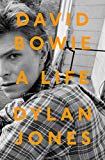David Bowie: A Life
Dylan Jones
Hardcover: 544 pages
Publisher: Crown Archetype (September 12, 2017)
ISBN-10:045149783X
ISBN-13:978-0451497833
https://www.amazon.com/David-Bowie-Life-Dylan-Jones/dp/045149783X
Reviewed by: Dr. Wesley Britton
When Prince died on April 21, 2016, just four months after the passing of David Bowie on January 10, there were immediate and numerous comparisons made between the two giants of music in terms of importance and influence. I well recall one TV commentator certain Prince was the more influential of the two.
Huh?
I can’t figure out that reasoning at all. For one matter, by the time of Prince’s first successes in 1979, Bowie had already made a decade-long cultural impact difficult to match. As some of the interviewees in Dylan Jones oral history of the life of David Bowie opined, Ziggy Stardust was where the ‘60s ended and the ‘70s began. A large number of British acts from U2 to Duran Duran acknowledge Bowie as an important influence. Not to mention acts like Mott the Hoople, Iggy Pop, Lulu, and Lu Reed who all benefited from Bowie’s career-saving hand. Later, Madonna and Lady Gaga also pointed to Bowie as a seminal influence on their careers. And all this before Prince set foot into a recording studio.
And, judging from the countless verbal snapshots in Dylan Jones oral history, Bowie’s impact on the many people who knew or simply met him was profound on many levels. For one matter, he was a figure with a deep well of interest from music to the visual arts to theatre and film to fashion to literature. Because of his shifting guises throughout his career, he worked with a wide range of collaborators, producers, musicians, and business advisors. Depending on your point of view, Bowie was simply following his vision or was callous in his leaving some of his associates behind as he changed directions throughout his career.
While painting a “warts and all” portrait of Bowie in the words of hundreds of personal interviews, Dylan Jones presents a more than rounded portrait of an artistic giant worthy of the many accolades Bowie received before and after his death, but certainly he was no saint. In his personal life, he enjoyed a wide range of sexual experiences. Many of them, by 2018 standards, could be considered child molestation. During the ‘70s, Bowie did a bit too much coke. And during the ‘80s, his artistic vision let him down when he crafted some admittedly substandard albums.
But, in the main, most commentators on Bowie in Dylan Jones’ biography remember Bowie in a very favorable light, from his private personal life to his work in the studio to his interactions with, well, seemingly everyone he ever met. From start to finish, Bowie is seen as an innovative artist with drive, talent, a special physical presence as well as intellectual abilities and curiosity. It’s such a personal book that those looking for insights into Bowie’s creative process may feel slighted, but there are no shortage of other books that explore such aspects of Bowie’s output.
I’ve always shied away from using the term “definitive” for any biography as many are comprehensive but usually lack in one aspect or another. Dylan Jones A Life comes close as he actually wrote very little but instead compiled a year-by-year history of Bowie and his circles using the voices of so many observers. It might not be the one and only book you should read about Bowie, but I can’t imagine any other tome out there that touches so many bases. Maybe not definitive, but certainly indispensable.
This review first appeared at BookPleasures.com on Aug. 20, 2018:


 Log in with Facebook
Log in with Facebook 


![[ The Man Who Sold the World: David Bowie and the 1970s Doggett, Peter ( Author ) ] { Hardcover } 2012 - Peter Doggett [ The Man Who Sold the World: David Bowie and the 1970s Doggett, Peter ( Author ) ] { Hardcover } 2012 - Peter Doggett](http://booklikes.com/photo/max/220/330/upload/books/8/b/8bc9a919ab4082452c2730c968193b09.jpg)





